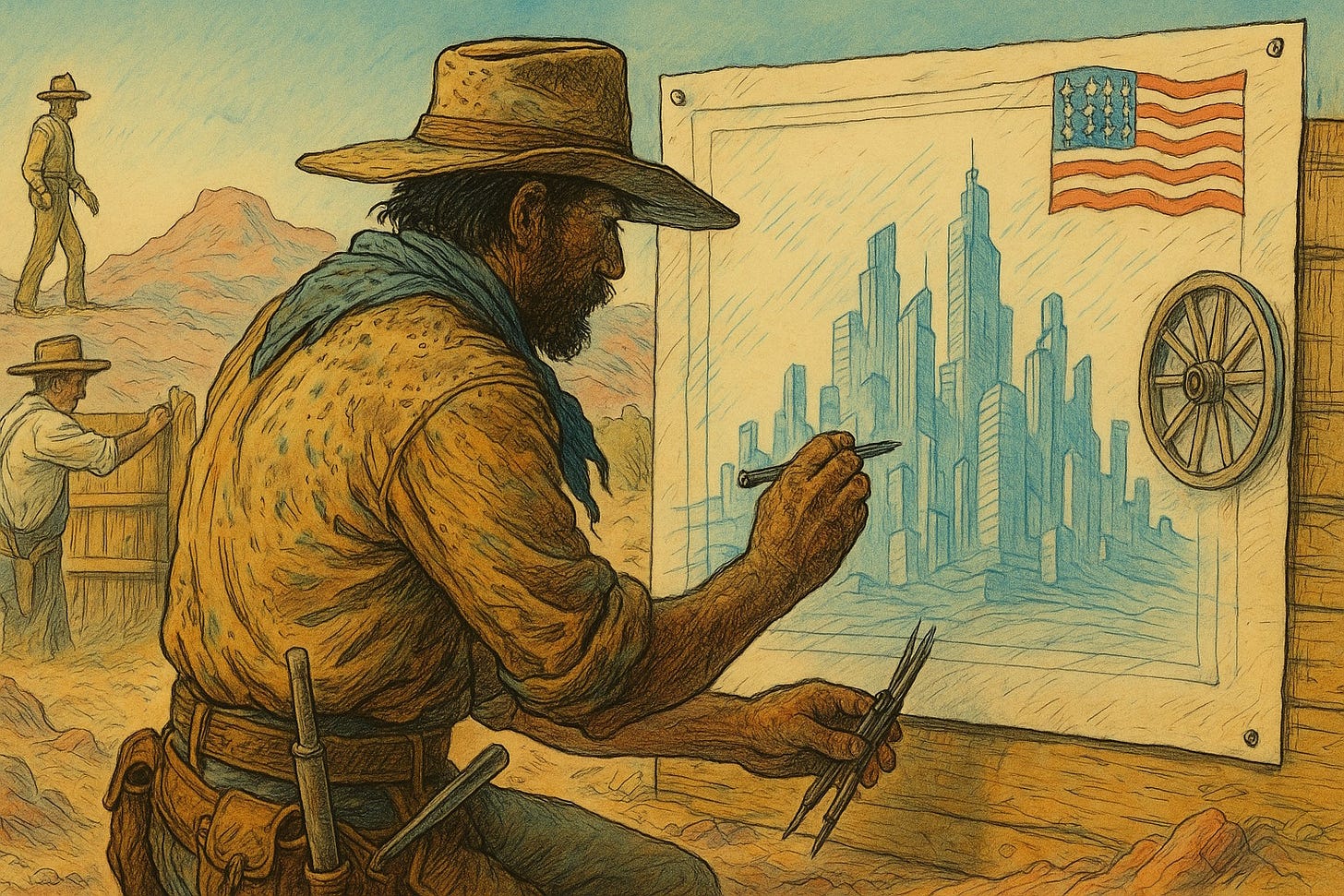Irresistibly Intoxicating Institutions
The accidental architects of civilization
[Epistemic status: This post was largely conjured up while watching TV under the influence of a heroic amount of edibles. The research consisted of half-remembered Wikipedia entries and a lot of “sounds about right”.]
I’ve been on a nostalgia kick for the early Prestige TV era, rewatching some of my favorites circa early aughts. My wife has never seen The Wire before and I got her absolutely addicted to it. We blazed through it and now are on Deadwood.
The series remain a masterclass in televised storytelling, I can’t praise both of them enough from that angle. But the themes they grappled with were heady meditations on the nature of institutions. I’m about to hammer on obvious points that have already been thoroughly investigated, namely that humans possess insanely insatiable desires, and whether that pursuit manifests in a constructive or destructive manner is predicated on a lot of blind luck.
So Deadwood is set in Deadwood in 1876, a real gold prospecting town that was illegally located within Lakota people territory. These people didn’t even have a legal right to be there but, they’re all still play-acting the law! They spit in their hands to secure contracts over land and property worth many times what one person could ever earn in a year. Like, ok, fine, maybe they didn’t have a right to build a saloon on land they didn’t own nor could ever own, but claiming someone won’t honor their contracts are goddamn fighting words. There’s something very powerful about the meme concept of promising an obligation, and then honoring that obligation, that even criminal cutthroats will obey it.
Watching this play out made me realize why Westerns as a literary and cinematic genre have such enduring appeal. I get it now. We’re watching a hybrid Establishment culture break West and assemble institutions in its wake. These are largely European settlers, but they ain’t no monarchists. There’s literally no authority, no government, within a hard day’s gallop. The only dispute mechanisms available come under threat of brute force.
Also, these people spent so much of their time outside. They’re…hippies living in the woods, but also fascistic murderous colonialists, but also honest businessmen. They were capitalist survivalists, charting a new path, and forging the carpet of a country they couldn’t possibly imagine the future of. This gung-ho fuck-you cowboy-murderer attitude, but also we primarily care about money and will always always honor a contract. What a fucked up bizarre concoction of a culture! Who knew that it would work so fucking well?
They also had honest-to-God folk heroes walking among them. Whether it was Icelandic sagas about rogue lawyers, or chivalric epics about knights in shining armor, there was always a corporeal distance between the common folks and heroes. No longer. Now you had a literate population who had an insatiable thirst for newspapers and pulp novels. They had photographs of their gunslinging heroes. These were the essential ingredients for memetic acculturation.
They had fugitive marshals that sometimes became actors but otherwise just went around being celebrities. Is that any weirder than our present fixation on celebrities and TikTok influencers? We’ve always needed these pylons of personality. The Big Strong Men of history laying expectations. The murderer, the outlaw, the rancher, the scout, the builder. They didn’t know it at the time, but they were architects of this country and the values we come to uphold.
This got me thinking about other institutions attaining resilience through life-or-death pressure.
Take the British Navy in the amazingly swashbuckling Master and Commander (2003) about an English frigate hunting for French ships in 1805. The English had a baller navy, and it couldn’t have worked without inventing what is basically a corporate hierarchy with a strong executive at the top. The captain wields an enormous amount of unquestioned authority with harsh discipline, but everything else must necessarily be sub-delegated with some level of autonomy.
There’s a scene after the English frigate narrowly escaped a devastating ambush by a French ship, where the commanding officers are sitting around the Captain’s quarters, kind of in awe of the ship that just tried to kill them. Marvelous gunnery, they’d say.
I realized then the scene was functionally identical to a bunch of Tech Bros sitting at a conference table around a project plan. How’s the server load? The cooling? Can we get a new branch commit?
The latter is applied towards a much more productive mission than dismembering some poor French sailors. The corporate hierarchies we use in dull Silicon Valley boardrooms? They’re descendants of practices refined when getting it wrong meant drowning in the Atlantic. If your procedures and policies and practices on a frigate were in any way deficient, you fucking died. Better get better quick! Every protocol, every chain of command, every delegation of authority was tested against the ultimate arbiter: survival.
What’s remarkable is how these blood-tested blueprints outlasted their original contexts. The frontier’s handshake contracts and the Navy’s rigid command structure both represent the same phenomenon — humans under extreme pressure accidentally creating institutions so robust they’d define civilization for centuries.



If you liked Master and Commander, do read the books! I've read the whole series three times. It follows Captain Jack and Doctor Maturin from Jack's first ship through to being an admiral. It's one of my favourite stories.
Stephen Maturin never quite understands how the Navy works, and the books kind of give readers the same experience, where you don't know exactly what the words mean or why they did what they did — and yet you are carried along anyway.
I love (!) reading what you write! Thank you.